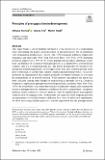| dc.contributor.author | Aravind, Athulya | |
| dc.contributor.author | Fox, Danny | |
| dc.contributor.author | Hackl, Martin | |
| dc.date.accessioned | 2022-10-11T17:28:36Z | |
| dc.date.available | 2022-10-11T17:28:36Z | |
| dc.date.issued | 2022-10-05 | |
| dc.identifier.uri | https://hdl.handle.net/1721.1/145779 | |
| dc.description.abstract | Abstract
This paper brings a developmental perspective to the discussion of a longstanding issue surrounding the proper characterization of presuppositions. On an influential view (Stalnaker in Synthese 22(1–2):272–289, 1970; Stalnaker, in Milton, Unger (eds) Semantics and philosophy, New York University Press, New York, 1974; Karttunen in Theor Linguist 1:181–194, 1974), formal presuppositions reflect admittance conditions: an utterance of a sentence which presupposes p is admitted by a conversational context c only if p is common ground in c. The theory distinguishes two modes of satisfying this formal requirement: (i) presuppositions may have common ground status prior to utterance, or (ii) they may achieve common ground status post hoc, via accommodation, an adjustment of the common ground by cooperative listeners so as to meet the requirements of an uttered sentence. While intuitive and general, the theory has been criticized (among other things) on methodological grounds (see e.g. Gazdar in Pragmatics: implicature, presupposition and logical form, Academic Press, New York, 1979): the availability of accommodation makes it difficult to empirically examine the notion of presupposition as admittance conditions because a central tenet—pragmatic infelicity results whenever c does not entail p—may be masked due to the pragmatic sophistication of language users. In this paper, we argue that child language presents an opportunity to avoid this intrinsic difficulty. In a series of behavioral experiments, we show that young children generate a default expectation that the presuppositions of an asserted sentence have common ground status prior to utterance. Furthermore and more tellingly, we also find that even when accommodation is the preferred option for adults, children fail to accommodate presuppositions in an adult-like manner. This pattern of behavior, we argue, is expected under the admittance theory: in a population where the interference from accommodation is reduced, the impact of failing to satisfy the formal admittance conditions becomes directly observable. | en_US |
| dc.publisher | Springer Netherlands | en_US |
| dc.relation.isversionof | https://doi.org/10.1007/s10988-022-09364-z | en_US |
| dc.rights | Creative Commons Attribution | en_US |
| dc.rights.uri | https://creativecommons.org/licenses/by/4.0/ | en_US |
| dc.source | Springer Netherlands | en_US |
| dc.title | Principles of presupposition in development | en_US |
| dc.type | Article | en_US |
| dc.identifier.citation | Aravind, Athulya, Fox, Danny and Hackl, Martin. 2022. "Principles of presupposition in development." | |
| dc.contributor.department | Massachusetts Institute of Technology. Department of Linguistics and Philosophy | |
| dc.identifier.mitlicense | PUBLISHER_CC | |
| dc.eprint.version | Final published version | en_US |
| dc.type.uri | http://purl.org/eprint/type/JournalArticle | en_US |
| eprint.status | http://purl.org/eprint/status/PeerReviewed | en_US |
| dc.date.updated | 2022-10-09T03:11:58Z | |
| dc.language.rfc3066 | en | |
| dc.rights.holder | The Author(s) | |
| dspace.embargo.terms | N | |
| dspace.date.submission | 2022-10-09T03:11:58Z | |
| mit.license | PUBLISHER_CC | |
| mit.metadata.status | Authority Work and Publication Information Needed | en_US |
